-
 Potrivit art. 248 C.pen. din 1968, fapta funcționarului public ce, în exercițiul atribuțiilor sale de serviciu, cu știință, nu îndeplinește un act ori îl îndeplinește în mod defectuos și prin aceasta cauzează o tulburare însemnată bunului mers al unui organ sau al unei instituții de stat ori al unei alte unități din cele la care se referă art. 145 sau o pagubă patrimoniului acesteia se pedepsește cu închisoare de la 6 luni la 5 ani.
Potrivit art. 248 C.pen. din 1968, fapta funcționarului public ce, în exercițiul atribuțiilor sale de serviciu, cu știință, nu îndeplinește un act ori îl îndeplinește în mod defectuos și prin aceasta cauzează o tulburare însemnată bunului mers al unui organ sau al unei instituții de stat ori al unei alte unități din cele la care se referă art. 145 sau o pagubă patrimoniului acesteia se pedepsește cu închisoare de la 6 luni la 5 ani. -
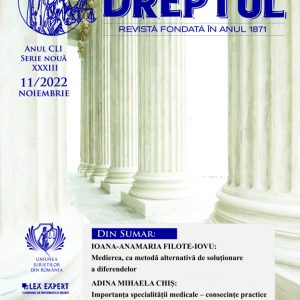 Through this material we tried to identify the reasons that were the basis for the adoption of Article 1622 of the Civil Code, through which certain third parties are protected from the effects of compensations potentially prejudicial to their situation. After exposing some preliminary considerations regarding the institution of compensation, we set out to present the main hypotheses that would be subsumed under this legal provision. Along with their evocation, we tried to extract the interests predominantly protected by the legislator, which justifies the blocking of the compensation. We believe that understanding these cases is essential for the fair application of Article 1622.
Through this material we tried to identify the reasons that were the basis for the adoption of Article 1622 of the Civil Code, through which certain third parties are protected from the effects of compensations potentially prejudicial to their situation. After exposing some preliminary considerations regarding the institution of compensation, we set out to present the main hypotheses that would be subsumed under this legal provision. Along with their evocation, we tried to extract the interests predominantly protected by the legislator, which justifies the blocking of the compensation. We believe that understanding these cases is essential for the fair application of Article 1622. -
 This article deals with an offence substantially amended under the new Criminal Code – i.e. the failure to comply with judgments. After a brief comparative presentation of new and old regulations, the author describes and analyzes the normative versions of the new wording: opposition to the execution, by making a stand against the enforcement authority; refusal of the enforcement authority to implement a judgment, by which it is bound to perform a certain act; refusal to assist the enforcement authority in the implementation of the judgment by people who are liable in this matter under the law; non-enforcement of judgment ordering the reinstatement of an employee; default in enforcing the judgment on the payment of wages within 15 days from the date of its enforcement application submitted to the employer by the interested Party; non-compliance of judgments on the establishment, payment, updating and recalculation of pensions; prevention of a person to use, in whole or in part, a property owned under a Court ruling, by the one against whom the same is enforceable.
This article deals with an offence substantially amended under the new Criminal Code – i.e. the failure to comply with judgments. After a brief comparative presentation of new and old regulations, the author describes and analyzes the normative versions of the new wording: opposition to the execution, by making a stand against the enforcement authority; refusal of the enforcement authority to implement a judgment, by which it is bound to perform a certain act; refusal to assist the enforcement authority in the implementation of the judgment by people who are liable in this matter under the law; non-enforcement of judgment ordering the reinstatement of an employee; default in enforcing the judgment on the payment of wages within 15 days from the date of its enforcement application submitted to the employer by the interested Party; non-compliance of judgments on the establishment, payment, updating and recalculation of pensions; prevention of a person to use, in whole or in part, a property owned under a Court ruling, by the one against whom the same is enforceable. -
 Potrivit art. 349 alin. (1) C.pen., neluarea vreuneia dintre măsurile legale de securitate și sănătate în muncă de către persoana care avea îndatorirea de a lua aceste măsuri, dacă se creează un pericol iminent de producere a unui accident de muncă sau de îmbolnăvire profesională, se pedepsește cu închisoare de la 6 luni la 3 ani sau cu amendă.
Potrivit art. 349 alin. (1) C.pen., neluarea vreuneia dintre măsurile legale de securitate și sănătate în muncă de către persoana care avea îndatorirea de a lua aceste măsuri, dacă se creează un pericol iminent de producere a unui accident de muncă sau de îmbolnăvire profesională, se pedepsește cu închisoare de la 6 luni la 3 ani sau cu amendă. -
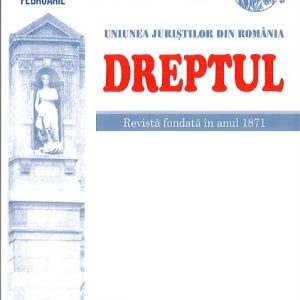 This study aims to present the main amendments that were brought to the Labour Code in France by the Law No 1088/2016. The emphasizing of these amendments seems to be a relevant one, given the many similarities between the French and Romanian labour legislation and also the fact that even France, which had a traditional labour legislation, has amended it for the purpose of rendering more flexible labour relations. In order to emphasize the amendments brought, the study contains a few comparative references also with regard to the regulation existing until the adoption of this normative act. As a fundamental guideline, the rights of employers are increased, but there are also regulations favourable to the employees. A change of vision is noticed with regard to the roles of the sources of labour law, for the purpose of bringing to the foreground the collective bargaining at the level of unit, to the detriment of the legal norms and of the conventional norms at level of branch of activity.
This study aims to present the main amendments that were brought to the Labour Code in France by the Law No 1088/2016. The emphasizing of these amendments seems to be a relevant one, given the many similarities between the French and Romanian labour legislation and also the fact that even France, which had a traditional labour legislation, has amended it for the purpose of rendering more flexible labour relations. In order to emphasize the amendments brought, the study contains a few comparative references also with regard to the regulation existing until the adoption of this normative act. As a fundamental guideline, the rights of employers are increased, but there are also regulations favourable to the employees. A change of vision is noticed with regard to the roles of the sources of labour law, for the purpose of bringing to the foreground the collective bargaining at the level of unit, to the detriment of the legal norms and of the conventional norms at level of branch of activity. -

-
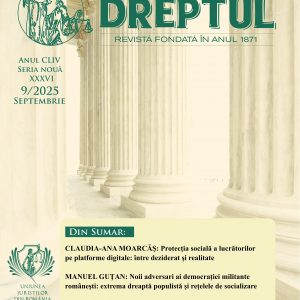
-

-
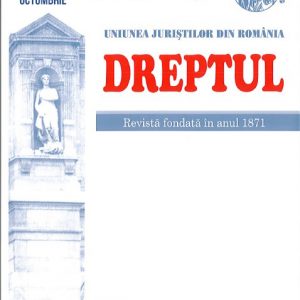 Both in the Member States and at European and international level there are currently concerns for finding the best means of combating tax fraud and tax evasion. Recent measures place the good tax governance among the means of fighting against this phenomenon, and it is estimated that joint actions at European level are more effective, being meant to encourage also third countries to apply minimum standards of good tax governance. At the same time, the concept of good tax governance, as well as those of tax fraud and tax evasion are taken under consideration by the doctrinaires in the field of criminal and tax law, but the definitions given to them have been imprecise and sometimes contradictory. In this context, we intend to emphasize the contribution of good tax governance as an effective means to prevent and mitigate tax fraud and tax evasion both at national, European and international level.
Both in the Member States and at European and international level there are currently concerns for finding the best means of combating tax fraud and tax evasion. Recent measures place the good tax governance among the means of fighting against this phenomenon, and it is estimated that joint actions at European level are more effective, being meant to encourage also third countries to apply minimum standards of good tax governance. At the same time, the concept of good tax governance, as well as those of tax fraud and tax evasion are taken under consideration by the doctrinaires in the field of criminal and tax law, but the definitions given to them have been imprecise and sometimes contradictory. In this context, we intend to emphasize the contribution of good tax governance as an effective means to prevent and mitigate tax fraud and tax evasion both at national, European and international level. -
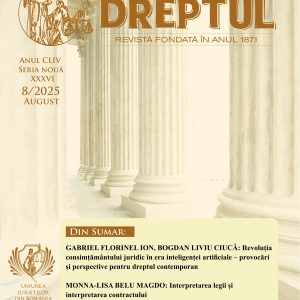
-
 Resulting from the frontal collision of two criminal law systems at the level of the legislation, theory and practice of criminal law, the crisis of the (science of) criminal law in Romania is a crisis of the „technical-legal method”. This crisis resulted from the lack of thoroughly analysing the foundations of this method configured in terms of general juridical theory in the context of the Historical School of Law from Germany, received in the particular matter of the theory of criminal law thanks to the contribution of the Italian criminal specialists (Arturo Rocco) and which became a traditional method of the Romanian science of criminal law due to its reception in Italy by Vintilă Dongoroz. In the broader plan of the general theory of law, the same crisis proves to be a crisis of the idea of science of law, explicable by the vicissitudes of the reception of the Historical School of Law in Romania over the last 150 years.
Resulting from the frontal collision of two criminal law systems at the level of the legislation, theory and practice of criminal law, the crisis of the (science of) criminal law in Romania is a crisis of the „technical-legal method”. This crisis resulted from the lack of thoroughly analysing the foundations of this method configured in terms of general juridical theory in the context of the Historical School of Law from Germany, received in the particular matter of the theory of criminal law thanks to the contribution of the Italian criminal specialists (Arturo Rocco) and which became a traditional method of the Romanian science of criminal law due to its reception in Italy by Vintilă Dongoroz. In the broader plan of the general theory of law, the same crisis proves to be a crisis of the idea of science of law, explicable by the vicissitudes of the reception of the Historical School of Law in Romania over the last 150 years. -

